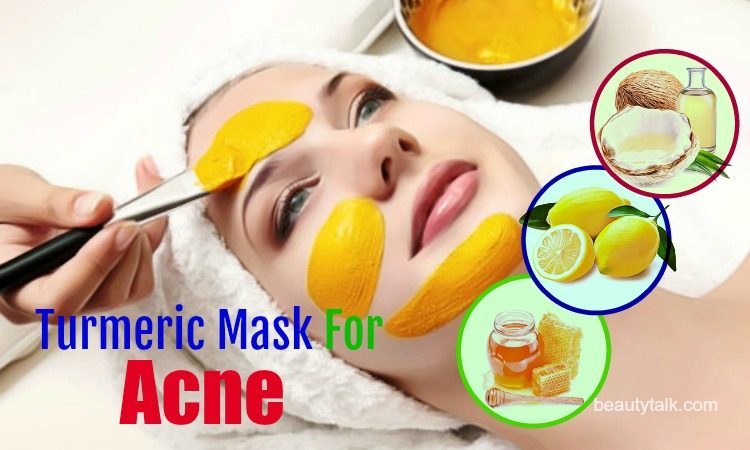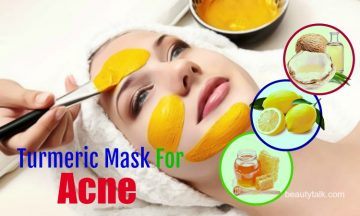In This Article
Acne is a common skin issue, which affects almost 50 million Americans. It affects nearly 50 percent of all adult women, 25 percent of all adults, and more than 90 percent of all teenagers. You have probably tried various products on the market if your supper from the problem of acne or any other skin ailments. Most lotions and creams aimed at dealing with acne are quite expensive. But do you know that there is a natural and cheap alternative? It is the spice turmeric. This spice not only adds better color and flavor to your food but also comes with numerous medicinal properties. In this post, we, Beauty Talk, will talk about the best ways to make a DIY turmeric mask for acne treatment.
- Other simple ways to use turmeric for acne treatment
- Best ways to use essential oils for acne & blackheads treatment
- Must-know tips to make a homemade face mask for acne treatment
- Unexpected foods that cause acne you should avoid
15 Best Ways To Make A DIY Turmeric Mask For Acne Treatment
I. Overview About Acne
1. What Is Acne
Acne is a disorder causing outbreaks of skin lesions generally called pimples. Acne lesions happen mainly on the face, back, neck, shoulders, and chest. It appears on the skin as tender red bumps also called zits or pimples, occluded pores also known as whiteheads or blackheads, pustules (bumps having pus), and cysts (boils, deep pimples). Severe acne can cause disfiguring and permanent scarring although acne isn’t a serious health threat.
2. Causes Of Acne
Acne is caused when small holes in the skin named hair follicles become blocked. Sebaceous (oil) glands are small glands found near your skin’s surface. Sebaceous glands help to stop the skin and the hair drying out by lubricating it. They do this by releasing an oily substance known as sebum. The glands start producing too much sebum in acne. The combination of excess sebum and dead skin cells creates a plug in the follicle or pore. If the plugged follicle or pore is close to the skin’s surface, it bulges outwards, forming a whitehead. Alternatively, it can be open to the skin, forming a blackhead. Harmless bacteria living on the skin can infect the plugged follicles, which in turn causes pustules, papules, nodules or cysts. Some main contributors to acne are discussed below:
- Hormonal Imbalance: It’s the most common reason for acne eruption in women. Female hormones fluctuate during periods, puberty, menopause, and pregnancy.
- Prescribed Medications: Certain prescribed medications you might be taking for different conditions may cause acne eruption. These medications are corticosteroids, anticonvulsants, and sobriety drugs.
- Stress: Stress is the main contributor to breakouts in women. Increased stress levels can trigger your body to release more androgen hormones. Androgens accelerate the oil-producing hair follicles and glands in the skin. Acne eruptions take place when these follicles and glands are over-activated during times of stress.
- Certain Personal Care Products: A few personal care products including hair greases or oil-based sunscreens prop up a specific type of acne called ‘acne cosmetica’. Thus, people having acne prone or oily skin should be careful while using hair and skin products. Instead, choose the products that read “non-acnegenic” or “non-comedogenic” because these labels show that the product is less prone to cause breakouts.
- Discontinuing Birth-Control Pills: Lots of women experience the acne flare-ups after they stop using birth control pills. This is because the pills may help regulate the hormones and hence, play a part in inhibiting breakouts.
3. Myths And Facts About Acne
- Myth 1
Acne is caused due to having poor hygiene and dirty skin.
Fact: There’s no direct link between acne and dirty skin or poor hygiene. Because most of the biological reactions triggering acne take place below the surface of the skin, scrubbing your face clean can have little impact on spots. Hence, over-cleaning the skin can aggravate the skin further.
BeautyTalk Partner Solutions

Ask Any Questions and Get Answers within Minutes, 24/7!
The Medical Experts are available whenever you need them. You can even approve payment only when you’re completely satisfied.
- Myth 2
Acne is caused due to a poor diet
Fact: While it is best to follow a varied, healthy, and balanced diet, it is unproven that the acne problem is caused by a poor diet. Acne results from hormones which enhance the excess sebum production, thus blocking the pores. Consequently, it leads to inflammation and characteristic spots, whiteheads or blackheads.
- Myth 3
Sunbathing, sunlamps, and sun beds are helpful for improving the symptoms of acne.
Fact: There is no evidence that utilizing sunbathing and sun beds can improve acne, they’re related to chances of developing skin cancer and increased skin damage.
- Myth 4
Squeezing blackheads, spots, and whiteheads is the best method to remove acne.
Fact: You shouldn’t scratch or squeeze spots because this can worsen them and may cause inflammation or even scarring.
II. Amazing Benefits Of Using Turmeric Mask For Acne
Curcumin in turmeric contains the therapeutic and medicinal agents. Curcumin is excellent for combating many health and skin ailments since it contains anti-inflammatory, anti-septic, anti-cancer, anti-bacterial, and other properties. Below let’s see a specific description of each agent that helps deal with the acne problem.
- Remove Oil Or Sebum: Applying turmeric can help remove excess sebum or oil from the skin pores. Plus, internal consumption of turmeric can restrict the sebaceous glands, thereby regulating the sebum secretion.
- Reduce Inflammation: The potential anti-inflammatory agents in curcumin can decrease swelling and promote skin healing.
- Kill The Acne Bacteria: The curcumin housed in turmeric can reduce the growth of P.acne bacteria from 50% to 96%.
- Control Insulin: One of the main causes of hormonal acne is imbalanced insulin levels. Decreasing levels of insulin can provide remarkable improvement in adult acne. According to a study, the curcumin can help lower diabetes and improve insulin resistance.
- Increase Antioxidant Ability Of Your Body: Free radicals are the main reason for many skin diseases such as acne, blemishes, rosacea, and others. Because of its chemicals structure, curcumin is potential in neutralizing the free radicals and boosting the development of antioxidant enzymes of your body.
III. DIY Turmeric Mask For Acne Treatment – Best Recipes
Want to know how to make a turmeric face mask for acne? Below, we have mentioned different recipes with detailed guidance.
1. Gram Flour And Turmeric Mask For Acne
How Does It Work
As you know, turmeric consists of potent infection-fighting agents and works to soothe inflammation. You can combine it with rose water and glam flour to create an effective mask to remove pimples and acne. Gram flour in this mask helps to absorb the excess oil from the skin. It additionally it scrubs and cleanses the pores, which helps prevent infection along with future acne breakouts. Apart from that, this mask contains rose water, which can tighten, tone, and hydrate the skin because it functions as an astringent.
What You Need
- Gram flour – two tablespoons
- Organic turmeric powder – one tablespoon
- Rose water
How To Do Gram Flour And Turmeric Mask For Acne
Pour the turmeric powder in one mixing bowl and add the gram flour to it. Add sufficient rose water and mix these things well to have a thick paste. Apply this mask to your face to fade away acne and pimples and wash it off after 10-15 minutes with cold water. For quick results, reapply it twice per week.
Precautions
Lots of people are allergic to gram flour and so can have skin irritation when using it.
2. Honey And Turmeric Mask For Acne
How Does It Work
Honey is highly effective in killing and restricting the growth of bacteria thanks to its antibacterial properties. Along with that, it aids in locking moisture in the skin cells that, in turn, keeps the skin hydrated. Plus, honey helps to detoxify your body. If you consume honey religiously, it will help to clean your blood, enhance metabolism, and rejuvenate your immune system.
What You Need
- Turmeric powder – one teaspoon
- Raw honey – two tablespoons
How To Do Honey And Turmeric Mask For Acne
Just combine the turmeric and honey in a bowl and mix them well to create a smooth paste. Begin to apply the mask to your face and rinse off after twenty minutes with lukewarm water. Slightly dry your skin with a soft towel. Follow it twice or thrice per week to attain glowing, soft, and acne-free skin.
Precautions
A few individuals are allergic to honey and ensure you perform a patch test with it.
3. Lemon And Turmeric Mask For Acne
How Does It Work
Lemon can cope with acne successfully because it holds anti-bacterial and antioxidant properties. Besides, the L-ascorbic housed in this fruit contains astringent properties that help to shrink the open pores. Apart from that, it is helpful for brightening your skin naturally since it embraces citric acid that serves as a bleaching agent. The combination of lemon and turmeric is excellent for getting rid of acne, acne scars & blemishes.
What You Need
- Turmeric – ½ teaspoon
- Lemon juice – one tablespoon
How To Do Lemon And Turmeric Mask For Acne
Mix the ingredients well and start applying carefully to your affected area. Let it work for 10 to 12 minutes before washing it off. You can apply this mask once daily for best results.
Precautions
Apply some lemon juice to a small skin area to do a patch test before proceeding any further for people with sensitive skin.
4. Coconut Oil And Turmeric Mask For Acne
How Does It Work
Coconut oil is full of medium-chain fatty acids, which work wonders in destroying the acne-causing bacteria named Propionibacterium acnes. It additionally contains anti-inflammatory properties, so it helps to bring down the redness and swelling. It also efficiently moisturizes the skin. In addition to this, it assists in healing skin damage and reducing scarring.
What You Need
- Extra-virgin coconut oil
- Turmeric – two teaspoons
How To Do Coconut Oil And Turmeric Mask For Acne
Take the organic turmeric powder into a bowl and add enough amounts of coconut oil to it. Mix these ingredients thoroughly to achieve a thick paste. Apply it to your face with the help of a cosmetic brush. Let this mask work on for 15-20 minutes and wash with lukewarm water. Apply this mask 2 to 3 times weekly will be beneficial for eliminating both acne & acne scars.
Precautions
Being highly comedogenic, coconut oil can clog pores. Consequently, this oil may worsen acne for some people. It isn’t recommended for people with very oily skin.
5. Yogurt And Turmeric Mask For Acne
How Does It Work
Yogurt is flooded with skin-friendly nutrients including B-vitamins, zinc, lactic acid, and calcium, which make it an awesome ingredient in skin care. Zinc is perfect for battling acne, especially inflammatory acne. This mineral works by killing and preventing the development and growth of acne bacteria such as P.acnes.
What You Need
- Turmeric – ½ teaspoon
- Yogurt (curd) – two tablespoons
How To Do Yogurt And Turmeric Mask For Acne
Just blend the turmeric carefully in the yogurt at first and later apply it to the affected region. After roughly 15 minutes, rinse it off. Use this mask 3-4 times a week.
Precautions
Avoid using this remedy if you’re allergic to dairy products.
6. Sandalwood & Turmeric Mask For Acne
How Does It Work
Sandalwood comes with medicinal properties which treat many skin conditions. It is potential in calming the skin inflammation caused due to acne, as it consists of soothing and cooling effect.
What You Need
- Turmeric – ½ teaspoon
- Sandalwood powder – two tablespoons
- Rose water
How To Do Sandalwood & Turmeric Mask For Acne
Take the turmeric and sandalwood powder in a bowl. Add some rose water to it to form a paste. Begin to apply this mask to your acne and wait for 15-20 minutes. Afterward, wash it off with enough lukewarm water. Reapply this mask twice a week.
Precautions
None
7. Aloe Vera And Turmeric Mask For Acne
How Does It Work
Aloe vera has been used to kill pain, cleanse wounds, and heal burns for centuries due to its anti-inflammatory, antibacterial, and antioxidant properties. The antibacterial abilities present in it are helpful to treat acne and decrease the redness caused by it. Plus, its antifungal properties work wonders in calming inflammation such as cysts and boils on the skin. It also comes with magnesium lactate that can eliminate the itching sensation caused due to acne. Last but not least, the astringent property of aloe vera can prevent acne breakout by removing dirt and excess oil from the skin.
What You Need
- Turmeric – ½ teaspoon
- Aloe vera gel – two tablespoons
How To Do Aloe Vera And Turmeric Mask For Acne
Take the aloe vera gel and mix it with the turmeric powder well. Start to apply this turmeric mask to your acne affected area. Let it remain for ten minutes and rinse it off with regular water. You can apply it daily or every alternate day.
Precautions
Do a patch test behind your ear, on your upper arm, or on your wrist to test your skin before using any new substance on the face. If you experience any sort of redness or reaction after using the aloe vera on the skin, avoid using it to treat your acne.
8. Milk And Turmeric Mask For Acne
How Does It Work
The lactic acid in milk works as a natural bleaching property that helps to lighten and brighten the skin, giving it an unblemished, smooth appearance. The combination of milk and turmeric powder is helpful in removing acne and sun tan. While skim milk is ideal for people with oily skin, whole milk is suggested for those with dry and combination skin.
What You Need
- Milk
- Turmeric powder – one tablespoon
How To Do Milk And Turmeric Mask For Acne
Pour the turmeric powder in a small bowl and add enough milk to achieve a thick paste. Apply it to your acne and after 15 – 20 minutes, wash off. Try this mask 3-4 times per week to get smooth and glowing skin.
Precautions
Do not use this mask if you’re allergic to milk.
9. Rice Flour, Yogurt, And Turmeric Mask For Acne
How Does It Work
Rice flour contains various oil absorbing agents and anti-aging agents. If you wish to eliminate pigmentation spots and acne, then you can use rice flour. The oil absorbing properties in it can aid in managing acne breakouts. You can mix together rice flour, yogurt, and turmeric to make a face mask that not only fades away pimples and acne but also lightens your skin naturally, giving you with clearer and brighter skin.
What You Need
- Turmeric powder – one teaspoon
- Rice flour – two teaspoons
- Plain yogurt – three tablespoons
How To Do Rice Flour, Yogurt, And Turmeric Mask For Acne
Just combine all the ingredients in a bowl and mix thoroughly. Apply the mixture to your acne-prone skin with a cosmetic brush. Allow it to sit on for 15-20 minutes, gently wet this face mask and scrub your skin for one to two minutes. Afterward, use water to rinse your face and pat dry. Apply this turmeric mask twice or thrice per week.
10. Olive Oil And Turmeric Mask For Acne
How Does It Work
Being a naturally antibacterial, olive oil can be beneficial for killing germs causing acne. It further helps to lower redness, inflammation, and swelling caused by breakouts. The vitamin E housed in this oil restores the natural oil balance of the skin which helps to inhibit acne and scars. Moreover, it is chock-full of mono-unsaturated fatty acids, beta-carotene, and vitamins D, E, and K, which all strengthen the immunity to inhibit infections causing acne.
What You Need
- Turmeric – one teaspoon
- Virgin olive oil – several drops
How To Do Olive Oil And Turmeric Mask For Acne
Just add the oil to the turmeric at first and next mix them lightly. Start applying this mask to your acne and rinse with water after approximately 15 minutes. Redo it once every day.
Precautions
To avoid sunburn, ensure you wash off the olive oil before going outside.
11. Garlic And Turmeric Mask For Acne
How Does It Work
Garlic holds the allicin that consists of antimicrobial properties that are useful for fighting off the bacteria contributing to acne. It also helps to ease inflammation and swelling, and enhance blood circulation. It also comprises the antioxidant properties that guard the skin against free radical damage.
What You Need
- Garlic cloves – 6
- Manuka honey – 2 to 3 teaspoons
- Turmeric powder – ¼ teaspoon
How To Do Garlic And Turmeric Mask For Acne
Pick up the garlic cloves and crush them into a smooth paste. Then, add the Manuka honey along with turmeric powder to the garlic paste and mix well. Apply this mask to your affected skin areas and rinse off with water after several minutes. Follow this method regularly to deal with acne and new breakouts.
Precautions
Using garlic topically can cause potential side effects such as allergic reactions, skin irritation or rash, clusters of skin lesions, and redness and swelling of the skin.
12. Neem And Turmeric Mask For Acne
How Does It Work
Neem possesses salicylic acid, which is a common ingredient in commercial products for acne. It further helps to control the sebum production. It is also a powerful anti-bacterial agent that helps to offer freedom from acne marks. Apart from that, it reduces rashes and redness due to its anti-inflammatory agent.
What You Need
- Neem oil
- Turmeric powder
How To Do Neem And Turmeric Mask For Acne
Just mix enough quantities of neem oil and turmeric powder to obtain a paste. Apply it to your acne lesions and let it remain on for 20 minutes. Afterward, rinse with water and pat dry. For quick results, repeat the process every day.
Precautions:
If you’re allergic to salicylic acid, don’t use this method.
13. Nutmeg And Turmeric Mask For Acne
How Does It Work
Nutmeg is well known for its curative properties that are ideal for healing skin ailments such as acne and acne scars. It can also be used for getting rid of the skin breakouts and easing the redness and inflammation related to acne. Furthermore, the minute granules in it serve as an exfoliant that is ideal for cleaning the pores and scrubbing off dead skin cells.
What You Need
- Turmeric powder – ½ teaspoon
- Nutmeg – ½ teaspoon
- Mint juice – ½ teaspoon
- Basil juice – ½ teaspoon
How To Do Nutmeg And Turmeric Mask For Acne
Mix all the elements well to create a paste and later apply it to your affected regions. Allow this mask to stay on for fifteen minutes and rinse with water afterward. Follow the procedure every day.
14. Tomato And Turmeric Mask For Acne
How Does It Work
Owing to its astringent properties, tomato can help to shrink open pores, decrease blemishes, and reduce the aging process. It is also loaded with potassium, iron, and other nutrients, all of which support skin health and lower scar formation. The magnesium present in tomatoes can provide you with youthful, radiant skin.
What You Need
- Tomato juice
- Turmeric
- Rice powder
- Raw milk
How To Do Tomato And Turmeric Mask For Acne
Just combine all the above ingredients in enough amounts to get a paste. Begin to massage this paste on your acne prone areas and leave this application for several minutes until dry. After that, rinse it off and pat dry. Repeat the process every day until you banish acne and acne scars.
Precautions
Before beginning regular topical tomato treatments, it’s best to do a patch test to ensure you are not allergic to tomatoes. Besides, leaving tomatoes remedies on your skin longer than recommended can lead to itching, dryness, redness or other irritation.
15. Oatmeal And Turmeric Mask For Acne
How Does It Work
Oatmeal is useful for reducing irritation, redness, and swelling caused due to acne breakouts because of its anti-inflammatory property. It lowers the acne breakouts and inhibits the formations of pimples, zits, and blackheads. Its powerful antioxidants are effective in preventing skin damage and helping skin retain elasticity and firmness. In addition to this, it can curb the production of oil and restore hormonal balance since it is abundant in magnesium, phosphorus, selenium, manganese, and zinc.
What You Need
- Oatmeal flour – one tablespoon
- Turmeric powder – ½ teaspoon
- Lentil powder – one tablespoon
How To Do Oatmeal And Turmeric Mask For Acne
Mix well the oatmeal flour, lentil powder, and turmeric powder and stir in sufficient water to obtain a paste. Then, apply it to your skin and after 25-30 minutes, rinse with water. For beneficial effects, repeat the remedy twice to thrice per week.
Precautions
Perform a patch test to ensure you are not allergic to oatmeal before following regular oatmeal treatments.
Before starting regular oatmeal treatments, do a patch test to make sure you’re not allergic to oatmeal.
IV. Turmeric Mask For Acne Treatment – Precautions When Using Turmeric Mask
Before using any of these methods, there are some things you must know about the DIY turmeric face mask for acne.
- Overusing turmeric mask may burn your skin. Thus, use a moderate amount of turmeric daily.
- It also may cause the redness of the skin for some people. Thus, be cautious and don’t leave it on for more than 30 minutes.
- Turmeric may offer a yellow tinge to the skin. Ensure you wash it off well with a toner or a cleansing lotion.
- Replace water with milk to have a softer looking skin if your skin is dehydrated and dry.
- Ditch your face wash & cleanser. The antibacterial agents of turmeric clean the face efficiently when you use turmeric mask or pack.
Now you discovered the best ways to make a DIY turmeric mask for acne treatment. Try one of these masks to say goodbye to your acne problem. Also, you can go to our main DIY Beauty to find our more recipes related to skin or hair care. We hope this post has answered all your queries or questions about the usage of turmeric for acne. All of the contents provided in this article are for informational & educational purposes. We recommend you consult a healthcare professional to determine which method is appropriate for you.













